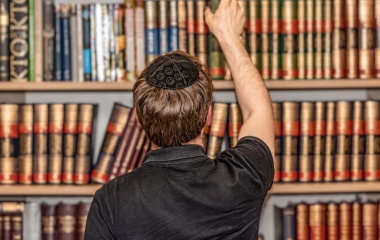
“A jewel in the mouth of Rava. The purpose of chochmah, wisdom, is teshuva and maasim tovim, good deeds”(Brachot 17a). Knowledge that increases one’s knowlege and nothing else is worth little, is largely a waste of time and is a tragic misuse of so much potential. With increased knowledge comes increased responsibility, both towards our own personal development i.e., teshuva, and in applying that knowledge to make the world a better place i.e., maasim tovim[1]. The more we know, the more we are able to do and hence, the more we must do. And the more we know, the more we realize how much we do not know, inspiring us to even greater knowledge and even greater teshuva and maasim tovim.
Learning can be a very selfish endeavour, even though it may lead one to become a more moral person. “Is there a Torah of kindness and a Torah that is not of kindness? …Torah for the sake of teaching is Torah of kindness; Torah that one does not teach, that is a Torah that is not of kindness” (Sukkah 49b).
At the other extreme, one can be a morally repugnant person yet provide knowledge that is greatly beneficial to the world[2]. One can be ruthless and morally wanting in one’s business dealings, yet give millions away in charity. Such are the inconsistencies of the human condition. One who is far from teshuva may often engage in maasim tovim. The purpose of knowledge, Rava teaches, is both teshuva and maasim tovim. Our knowledge must have a positive impact both on our personal growth and on the world-at-large.
Chochmah in rabbinic literature refers to general knowledge. All types of knowledge are to lead to teshuva, as we gain a deeper understanding of G-d’s world and our place in it. And when it comes to maasim tovim, acts that make the world a better place, general knowledge often accomplishes more than pure Torah knowledge. Knowing Shas is great, but discovering a cure for cancer will have a much greater impact on the world-at-large. It is not by chance that we are to “Observe them [the mitzvot] faithfully, for this is your wisdom and discernment to other peoples, who on hearing of all these laws will say, ‘Surely, that great nation is a wise and discerning people’” (Devarim 4:6). It is from this verse that our Sages derive (Shabbat 75a) an obligation to study science, the ‘wisdom of the nations’. By combining the observance of the mitzvot with practical knowledge that betters the lot of man, we will inspire others to do the same.
As individuals, we keep mitzvot so that we can be better people, but as a nation, observance of mitzvot means acquiring the knowledge that will make the world a better place. We are blessed that for the first time in 2,000 years, we are witness to the Jewish nation’s tremendous impact for good for the world-at-large.
Because knowledge is so powerful and has so much potential, it can be misused and cause great harm—and all too often, it is. That much is obvious. What Rava notes is that Torah knowledge is no different.
Rava continues, “It shall not be that a person koreh, reads, v’shoneh[3], learns, and kicks his father and his mother and those who are greater than him b’chochmah uminyan, in wisdom and number, as it is written, ‘The beginning of wisdom is fear of G-d, a good understanding to all who fulfill them.’”
How terribly tragic when parents invest in their children’s education, only to have the children think and act like they know better[4]! How sad when a student who owes his knowledge to his teacher and should kiss him, “kicks” him instead! It is the height of ingratitude—and stupidity, too. The child may think he knows more, and may in fact have more “technical” knowledge. But when it comes to wisdom and numbers, i.e., life experience gained over time, he is little but a fool.
The use of the expression chochmah uminyan is instructive. It is a term borrowed from the Mishna (Eduyot 1:4), where it is used to explain why a rabbinic decree cannot be overturned despite its non-applicability, unless the second court is greater b’chochmah uminyan. In practice, absent a Sanhedrin, that is generally considered impossible today. Rava feels the same way when it comes to the relationship between a children and students with their parents and teachers. Children and students may argue with parents and teachers, disagree with them and at times, follow different practices. But they may not reject them and ignore their teachings because one is now more religious or knowledgeable than one's mentors.
Rava then offers a powerful interpretation and daring application of the proof-text of this teaching; “’A good understanding lekol oseihem, to all who fulfill them’. 'All who fulfill them' lishma, for their own sake, and not for those who fulfil them shelo lishma, not for their own sake. Those whose learning does not lead to teshuva and maasim tovim cannot be said to be learning lishma. Such people may think they are acting lishma, that they are the defenders of the faith, but their actions cannot be considered to be for the sake of heaven[5].
But one may argue that this is not so bad. In no fewer than six places do our Talmudic Sages note that, “One should always be engaged in Torah and mitzvot shelo lishma, for from doing so shelo lishma, one will [eventually] come to do it lishma.”
Such may be true if one does mitzvot to receive honour and the like, but when one “kicks” his parents and teachers, the very ones who paved his path, then Rava has a different attitude. “One who does [mitzvot] shelo lishma, not for their own sake, it would have been better had they not been created”.
[1] I am interpreting maasim tovim in its broadest sense, referring to knowledge that is used to better mankind. The maasim tovim that we each do on an individual basis is equally important, but it seems to me, is included in Rava’s definition of teshuva.
[2] Thus the debate whether we may apply knowledge improperly gained, the most extreme example being from Nazi medical experiments. It is interesting to note that our legal system does not allow evidence that was obtained improperly, even if it is 100% accurate.
[3] Whereas chochmah refers to all forms of knowledge, mikra refers specifically to the Torah shebichtav, the Written Torah, and shoneh refers to the Oral Law.
[4] I recall years ago reading an article by Dr. Aharon Fried (Hakira #9, see here p. 147) where he related a case of a young boy from a traditional but not fully observant home. The parents sent the boy to day school and he was inspired to become fully shomer Shabbat. His parents drove to shul every Shabbat and the boy refused to travel with his parents. The case was brought to Rav Avraham Pam, Rosh Yeshiva of Torah v'Da'at and he paskened, ruled, that since the child was below bar mitzvah and merely a passenger in the car, kivud av v’eim required him to go with his parents to shul by car on Shabbat!
[5] The Netziv (see his introduction to Breisheet), writes that “G-d hates these types of tzadikim” referring to those who reject others because they think their way is the only way. One may be a tzadik, but sometimes that can be a terrible thing. This idea is most applicable here.



